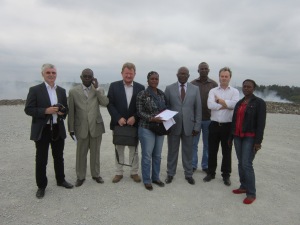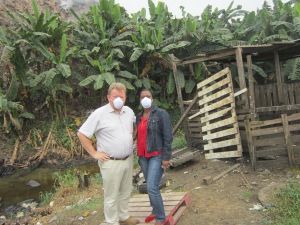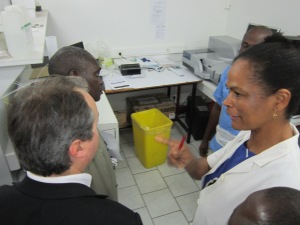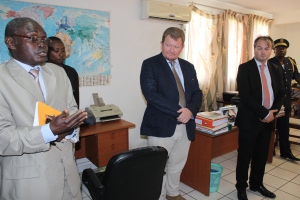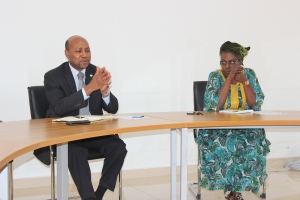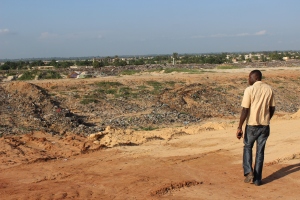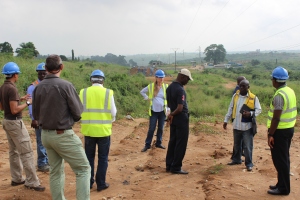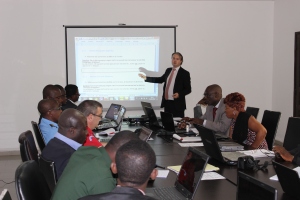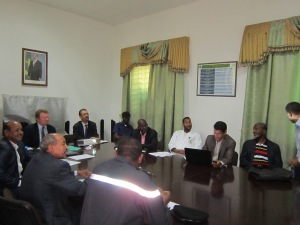The fact finding Mission to Monrovia consisted of: Andrew Proudlove and Alexandre Custaud . The Mission was organised with the kind advice and assistance of the Liberia National Focal Point, Mr Martin Scott-Tabi of the Ministry of Foreign Affairs who accompanied the team throughout. It should be noted that the Mission was carried out in the shadow of the developing Ebola crisis in Liberia.
VISITS
National Expert Team

Environmental Protection Agency (EPA)
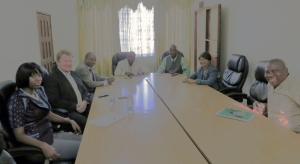
The team met Anyaa VOHIRI, MA, J.D., Executive Director/CEO of the EPA, and her team, and gave a presentation on Project 35. Key points from subsequent discussions are as follows:
- The EPA is the successor of the National Environmental Commission of Liberia (NECOLIB) first established in 1999. With support from UNDP and UNEP, the EPA has developed the infrastructure and staff to transform itself into a fully operational EPA. The EPA also works closely with Global Environmental Facility (GEF) and the Convention Secretariats of the various UNEP Multilateral Environmental Agreements (MEAs).
- In 2003 as a commitment to the environment, the Liberian Government ratified laws that dramatically reformed the countries natural resource management. One was the formation of the National Environmental Policy for Liberia. Its companion bill was the Environmental Protection Agency Act which established the EPA and charged it with clear responsibilities.
- National Environmental Policy – NEP Act – This act mandates a comprehensive set of laws and legal framework to protect the environment through sustainable development and management. It also establishes the EPA and the institutional arrangements that support the Agency, to protect the environment. http://postconflict.unep.ch/liberia/pdf/NEP_ACT.pdf
- Environmental Protection Agency Act (EPA’s mandate) – EPA Act – This act establishes the EPA as the principal authority in Liberia for the management of the environment. To coordinate, monitor, supervise and consult with relevant stakeholders on all activities in the protection of the environment and sustainable use of natural resources. http://postconflict.unep.ch/liberia/pdf/EPA_ACT.pdf
- Anyaa VOHIRI. Stressed the importance of the planned P35 network and the sustainability of the project.
- Problems identified by EPA:
- Medical biological waste is a national problem particularly during the current Ebola Epidemic;
- Liberia needs incineration and cremation capabilities. At present, medical waste is usually put into the ocean;
- Liberia needs chemicals management and facilities to neutralize waste;
- There is a need for education on hazardous chemicals;
- The Ministry of Agriculture has obsolete pesticides that are not handled properly;
- There is a need for an assessment of contaminated sites and a system to be put in place for remediation;
- There is an environmental law but with no specific guidelines for enforcement;There is no capacity for enforcement in Liberia
- there is no biological or chemical detection equipment;
- MCC Monrovia City Corporation is responsible for disposal of domestic waste but not hazardous waste;
- Private entities are collecting waste but do not have the capability to dispose of medical waste;
- Education is needed on triage of waste
- Environment is not a high priority on the agenda of the government in Liberia.
Liberia National Taskforce Meeting on Ebola in the Minister of Health’s Conference Room

The P35 Team and the NFP, Prof. Martin Scott-Tabi, participated in the daily Liberia National Taskforce Meeting on Ebola in the Minister of Health’s Conference Room” which manages the the Ebola Epidemic in Liberia. The P35 Team briefed Dr Walter T. GWENIGALE, M.D., Minister for Health & Social Welfare, and the Taskforce on Project 35.
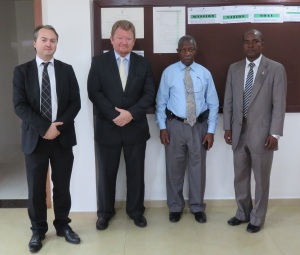
Problems identified by the Taskforce are as follows:
- There was a need for a well-defined Incident Management system.
- There were insufficient materials, equipment and budget.
John F Kennedy Hospital

The team met briefly with the doctor in charge of Ebola victims at JFK and gave a short outline of Project 35.
National Reference Laboratory

The P35 team met the head of the National Reference Laboratory (NRL). This laboratory had been built in 2008 by a project funded by United Nations Industrial Development Organization (UNIDO). Since then, the NRL has had neither electricity nor mains water supply. The NRL had not been accredited yet, and imported / exported products were not being tested in Liberia. There is no Mains electricity in Liberia although a Hydro-Electric project promises electrification of Monrovia in 2015.
UNIDO had provided training opportunities for NRL personnel to achieve expertise in various testing disciplines and product sectors. Assistance has also included preparation of laboratories for accreditation through development of their capacity to comply with ISO/IEC 17025 and associated accreditation criteria. More recently, UNIDO has also been preparing guidance documents and training relevant personnel on operation of proficiency testing programs and on the significance of certified reference materials and the various Guides on this subject produced by ISO REMCO.
Retention of trained staff was a problem. Commercial organisations in Liberia such as Firestone and Mining companies have recruited trained staff from the NRL. Some of these had been trained at the JRC in Ispra or in India and China
Some critical laboratory equipment was lacking.
Liberia Medicines and Health Products Regulatory Authority (LMHRA)
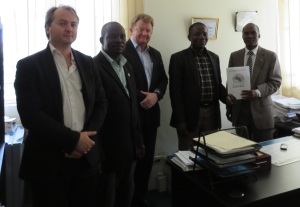
The team met with Dr. David SUMO, RPh, Managing Director of the LMHRA and gave a presentation on Project 35. Key points from subsequent discussions are as follows:
- The LMHRA was created in 2010 and has an ISO/IEC 17025 accredited laboratory at the JFK hospital. The Team was not able to visit the laboratory because of the Ebola crisis
- Government support for LMHRA was not a high priority and as a result it is struggling with low funding and lack of logistics
- There was a need for a modern incineration capability to destroy expired pharmaceutical stocks
- There was a real need for training of technicians and scientists.
- There was a problem of hazardous chemical waste arising from scrap.
- There is an accumulation of expired chemical waste from laboratories. These expired chemicals are temporary stored and not properly handled, exposing the population to risk.
- There was an accumulation of pharmaceutical waste in warehouses.
- There was no recycling process in place and the issue of pharmaceutical waste disposal was a major challenge
- in 2013 LMHRA promoted the country’s image during a ceremony marking Africa’s best health in Accra, by taking a second place position in the good health facility program.
- LMHRA kindly provided the Team with a copy of its own waste management guidelines.
Monrovia City Corporation (MCC)


The team met with Sayetta K. DOMAN, Head, Environmental Health and Safety Dept, Monrovia City Corporation (MCC) and C Kaye WINTER, leader of the MCC Health and Safety Protective Response Unit.

- MCC is charged with the collection and disposal of solid waste and has received funding and support from UNEP in cooperation with the EPA
- There is a need for a large modern incinerator outside Monrovia for all hazardous chemical and biological waste.
- One of MCC’s main problems is that biomedical waste goes into the mainstream flow of waste.
- There is a newly developed final disposal site called Whein Town. Hazardous waste cannot be disposed of there.
- MCC has several large public rooms that could be used for training and education events.
- MCC is experienced in the management and execution of public information campaigns and expressed a wish to assist P35 in its public information campaign
Conclusion
The current situation with the Ebola Epidemic had increased tension in the country and highlighted the difficulties in managing hazardous biological waste. The environment did not seem to be a high resource priority for the government and the lack of legal framework, enforcement, equipment, and training were problems identified by the P35 team. As with other West African countries, Liberia has an under-resourced but well-motivated hazardous chemical and biological waste management community that is looking forward to the beginning of Phase 2 of Project 35.
Importantly, as with some other West African countries, it must be noted that Liberia has no modern incineration or crematory capabilities. This is a major capability gap and the Project team has contacted the World Bank in order to suggest urgent funding and provision of these vital capabilities.




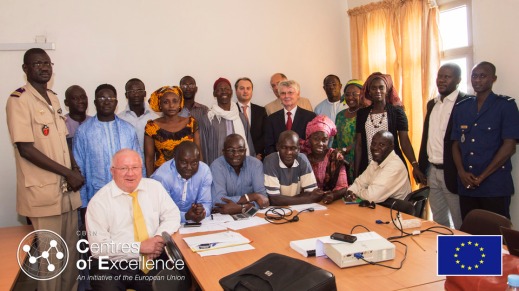
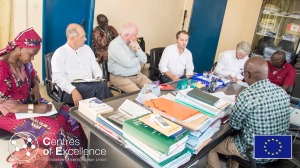

 VICAT is a French cement-manufacturing corporation with an international presence.
VICAT is a French cement-manufacturing corporation with an international presence.













